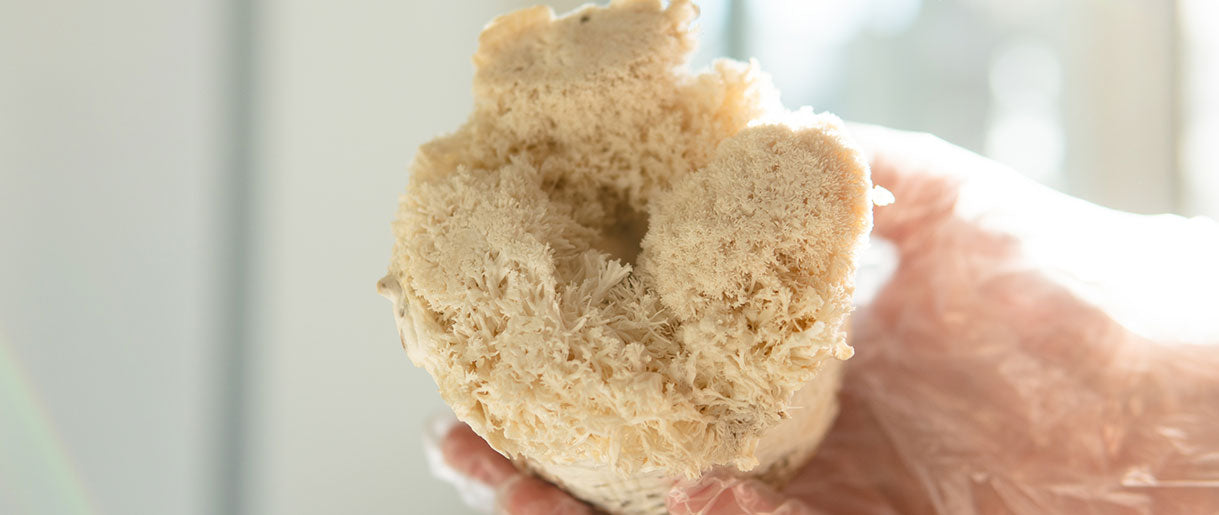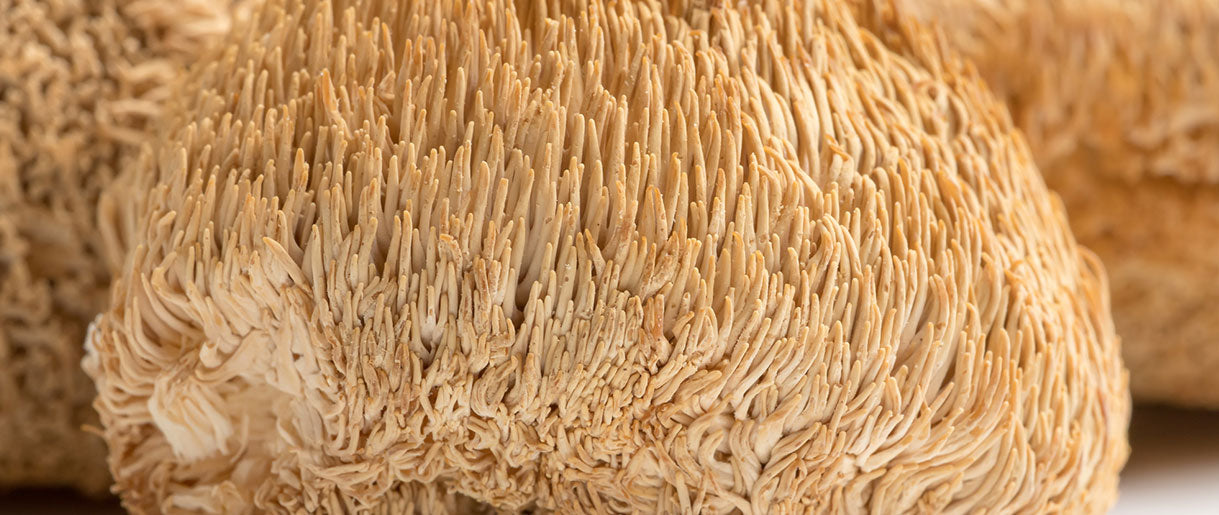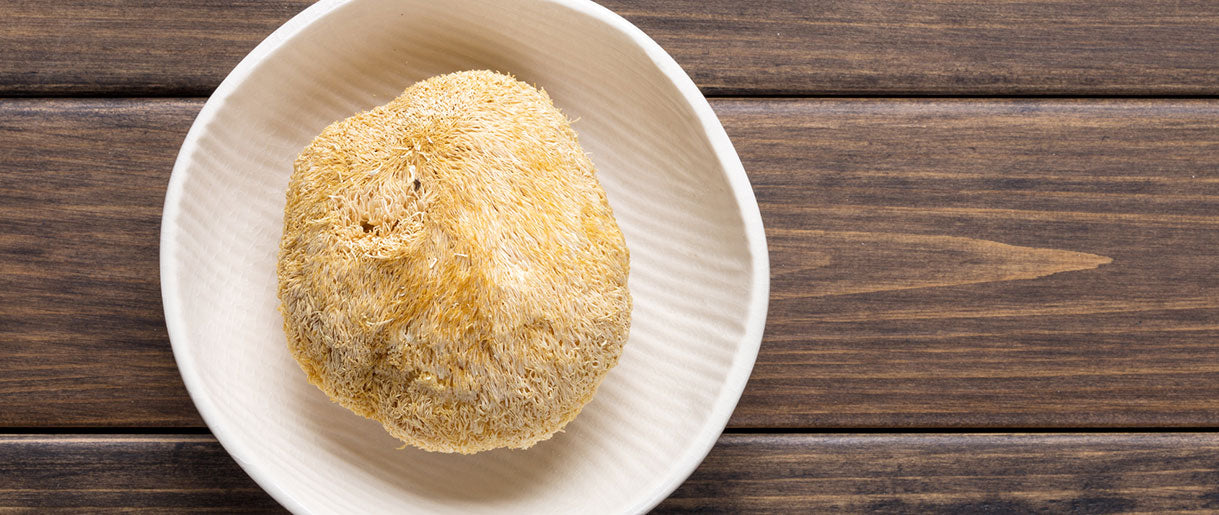Lion's Mane mushroom, renowned for its neuroprotective properties, indeed shows promising results in scientific studies. Research suggests it can enhance cognitive functions, including memory and concentration, boost the immune system, and exhibit anti-cancer properties.
There is no shortage of research studies showing Lion's Mane works. For example, a research study conducted in 2018(1) verified that Lion's mane could boost recognition memory. Moreover, a newer study conducted in 2022(2) showed that Lion's mane could be an effective therapy for people with Alzheimer's disease. Yet another study conducted in 2017(3) proved that Lion's mane could modulate the immune system, helping the body fight diseases.
Lion's mane has been part of traditional Chinese medicine for centuries. Traditional Asian healers used this mushroom to improve brain health and cognitive function, improve immunity, and fight depression and anxiety.
The studies above prove that this fungus works—however, how does Lion's mane work? In the following sections, we will help you discover how Lion's mane supplementation, whether in powders, capsules, or fresh mushrooms, helps patients fight different diseases. But first, let's first have a deeper understanding of this unique mushroom.
Lion's Mane Mushroom: An In-Depth Look at This Unique Fungi

Appearance and Habitat of Lion's Mane Mushrooms
Lion's mane mushrooms, aptly named for their unique appearance that resembles the majestic mane of a lion, are gaining traction in the world of medicinal mushrooms. Found predominantly in North America, Europe, and Asia, these fascinating fungi thrive on wild hardwoods and are recognized for their potential health benefits.
Traditional Use and Medicinal Properties
Traditionally used in Asian cultures for medicinal properties, Lion's mane mushroom is now entering the mainstream health and wellness sector. The Lion's mane medicinal mushroom is increasingly being incorporated into dietary supplements, known as Lion's mane supplements, for its purported health benefits.
Active Components and Their Role
The health benefits of Lion's mane mushroom primarily stem from its active components, which include hericenones and erinacines. These compounds are believed to stimulate nerve growth factor (NGF), a protein that plays a crucial role in nerve cell maintenance, survival, and regeneration.
Impact on Cognitive Health
One of the most significant health benefits of Lion's mane mushrooms is their potential impact on cognitive health. Studies suggest that these medicinal mushrooms may help individuals with mild cognitive impairment, potentially enhancing memory and mental clarity.
Beyond Cognitive Health: Other Potential Benefits
The benefits of Lion's mane mushrooms extend beyond cognitive health. Research also indicates many other potential benefits, including bolstering the immune system, reducing inflammation, and even showing promise in cancer treatment.
How Does Lion's Mane Work: A Look At Scientific Evidence

People take Lion's mane as a dietary supplement to treat conditions ranging from depression to dementia or to preserve general health and well-being. Below, we will take a deeper look at the various ways Lion's mane works to produce its renowned health benefits in humans:
For Brain Health

Lion's mane improves brain health by promoting neurogenesis, which is the growth and development of neurons. It also contains compounds with antioxidant and anti-inflammatory properties, which have the potential to protect the brain from damage caused by oxidative stress and inflammation.
According to a study conducted in 2013(4), Hericenones and Erinacines induce the production of nerve growth factors (NGF). The study also noted that these compounds enhanced neurite outgrowth.
Lion's mane's ability to promote neurogenesis makes it an effective therapy for a variety of diseases caused by issues that affect the brain cells, including:
- Parkinson's disease
- Dementia
- Alzheimer's disease
- ADHD
In addition to boosting focus and cognition, Lion's mane neurogenesis benefits allow it to promote nerve regeneration, speeding up the rate at which nervous system injuries recover. Lion's mane products also help to prevent and reverse cognitive decline, improve memory and learning, and ease symptoms of depression and anxiety.
For Immunity

Lion's mane may boost immunity due to its high concentration of beta-glucans, complex polysaccharides known to activate the immune system. Research has shown that(5) Beta-glucans stimulate the activity of immune cells, such as macrophages and natural killer cells, which play a crucial role in defending the body against infections and diseases.
For Gut Health

Lion's mane mushrooms may boost gut health by supporting the growth of beneficial bacteria in the gut. It contains prebiotic fibers that serve as a food source for the beneficial bacteria in the gut, which can improve the balance of gut microflora. In a study(6), researchers determined that short-term Hericium erinaceus supplementation changes gut flora.
A healthy balance of gut microflora is essential for maintaining a healthy gut and overall health, as it plays a crucial role in digestion, nutrient absorption, and immune function. Additionally, some studies suggest(7) that Lion's mane may help to improve the symptoms of gut-related disorders, such as irritable bowel syndrome (IBS) and inflammatory bowel disease (IBD).
For Heart Health

Lion's mane may improve heart health through several mechanisms. First, it contains compounds with antioxidant and anti-inflammatory properties, which may help reduce inflammation and oxidative stress linked to an increased risk of heart disease.
Second, it regulates cholesterol levels by decreasing levels of low-density lipoprotein (LDL) cholesterol, known as "bad" cholesterol, and increasing levels of high-density lipoprotein (HDL) cholesterol, known as "good" cholesterol. In a 2014 study(8), researchers determined that Lion's mane can suppress LDL oxidation.
Moreover, Lion's mane mushrooms may improve blood flow and circulation by promoting nitric oxide production. This molecule helps to relax and dilate blood vessels, thereby reducing blood pressure and improving blood flow to the heart and other organs. Finally, studies suggest that(9) Lion's mane may help to reduce the risk of blood clots, which can cause heart attacks and strokes.
For The Kidneys

In 2017, researchers described how Hericium erinaceus(10) polysaccharides improved diabetic mice's kidneys.
Lion's mane mushroom extract had the reno-protective effect of reducing the aberrant rise in blood urea nitrogen (BUN) and creatinine (CRE) levels. In addition, the mushroom extract also reduced the pathological damage to the kidney based on other biochemical criteria.
For Diabetes

Lion's mane may help fight diabetes through several mechanisms. One mechanism is reducing inflammation and oxidative stress, which contribute to the development and progression of diabetes.
Lion's mane contains several antioxidant and anti-inflammatory compounds, including polysaccharides and beta-glucans, which reduce inflammation and oxidative stress in the body. Lion's mane extract can reduce oxidative stress and inflammation in the pancreas, protecting the pancreatic cells that produce insulin.
Lion's mane may also help regulate and lower blood sugar levels. Studies have found(11) that Lion's mane extract can help to lower blood sugars and improve insulin sensitivity.
For Cancer

Lion's mane stimulates the immune system, which can help the body fight cancer cells more effectively. Additionally, Lion's mane contains antioxidants that can protect cells from damage caused by free radicals that may lead to cancer development.
Lion's mane also induces apoptosis, which is programmed cell death in cancer cells. By causing cancer cells to die off, Lion's mane can prevent cancer from spreading. Moreover, it inhibits angiogenesis, the process by which tumors develop their blood vessels to grow and spread. By inhibiting angiogenesis, Lion's mane can help prevent the growth and spread of cancer.
Read More: See how Lion's mane fights cancer.
Does Lion's Mane Work Immediately?

Lion's Mane supplements may have some immediate effects, but the full benefits of Lion's Mane supplementation may take time to develop.For example, some people report feeling more alert, focused, and energized shortly after taking Lion's Mane, possibly due to the mushroom's ability to support cognitive function and reduce fatigue.
However, other benefits, such as improved immune function, gut health, and heart health, may take longer to develop and require regular use of Lion's Mane over an extended period. Lion's mane extracts may also take longer to fight serious issues like sleep disorders, memory loss, and excessive blood clotting.
To enjoy Lion's mane's health improvement benefits, make the mushroom part of your diet and nutrition. Consuming these fungi regularly is the most effective way to enjoy their benefits in fighting cancer cells, boosting brain function, fighting nerve damage, and even fighting conditions like arthritis.
How Do You Take Lion's Mane Mushrooms?

There are numerous ways to add Lion's mane medicinal mushrooms to your diet. The most common method, however, involves using Lion's mane supplement.
The most common supplement form is Lion's mane mushroom powder. Mix Lion's mane mushroom powder in your morning coffee to promote nerve growth. You can also sprinkle the wellness product from mushroom yamabushitake on your supper before bed to improve sleep quality.
Another way to take advantage of the health improvements provided by Hericium Erinaceus is to use its extracts in the form of capsules and tinctures. These give you more convenience as you can take them anywhere, and they can stimulate the production of the nerve growth factor, fight stomach ulcers, and boost your metabolism.
If you have some spare time, you can always use fresh Lion's mane fruiting bodies as one of your ingredients when cooking. However, if you are new to cooking these fungi, use our detailed Lion's mane mushroom recipes.
How Much Lion's Mane Is Recommended?

Daily 250 mg to 3,000 mg of Lion's mane mushrooms are effective. You can divide this Lion's mane dosage three times, take one in the morning, another at lunch, and the last before sleeping. Alternatively, add one scoop of powdered Lion's mane to your tea or coffee each day for two weeks to experience the potential health benefits of Lion's mane.
Increasing Lion's mane dosage for the first three weeks is advised to speed up the cognitive effects of taking it. Then lower it based on how much works for you. Be sure to talk to a health care professional before using Lion's mane mushroom extract—this will help you reduce the risk of suffering from side effects by taking excess amounts.
FAQs About Does Lion's Mane Work
How Long Does Lion's Mane Take To Work?
The time it takes for Lion's Mane to work can vary significantly from person to person, mainly depending on factors such as dosage, individual metabolism, and the specific effects one is looking for.
For some cognitive benefits, like increased focus or improved mood, some users report feeling effects within just a few hours of ingestion. However, consistent use over several weeks to months may be required for long-term benefits, particularly relating to memory and nerve health.
Some studies on Lion's Mane, particularly those related to cognitive function in adults with mild cognitive impairment, have typically spanned weeks or months. For example, in one particular study(12), subjects consumed Lion's Mane for 16 weeks and showed significant cognitive improvement.
What Does Lion's Mane Do To The Brain?
Lion's mane mushroom improves cognitive function and memory. Studies suggest that this is due to the mushroom's ability to stimulate the growth of nerve cells in the brain. Lion's mane also has neuroprotective properties, protecting against the development of neurodegenerative diseases such as Alzheimer's and Parkinson's.
In addition, Lion's mane contains anti-inflammatory compounds that help reduce inflammation in the brain, which is often linked to several brain disorders. Some research also suggests that Lion's mane may have anxiolytic and antidepressant effects by increasing the production of compounds that promote feelings of well-being, such as serotonin and dopamine.
Can I Take Lion's Mane Every Day?
Lion's mane mushroom is generally considered safe to consume, and many people take it as a dietary supplement daily. However, as with any supplement or medication, it's essential to follow the recommended dosage and consult a healthcare provider before adding it to your daily routine.
The recommended dosage of Lion's mane can vary depending on the form. For example, if taken as a supplement in capsule or powder form, the typical dose ranges from 250 mg to 3,000 mg per day. However, if consumed as a food, there is no specific recommended dosage.
Does Lion's Mane Affect Hormones?
There is currently limited research on the effects of Lion's mane mushroom on hormones, but the available studies suggest that it may have some impact on certain hormones in the body.
One study found that consuming Lion's mane extract over four weeks led to a decrease in levels of the hormone cortisol, often referred to as the stress hormone. The study also found that participants who took Lion's Mane experienced improvements in mood and feelings of well-being.
Another study found that(13) Lion's mane extract had estrogenic effects in female rats, acting like estrogen in the body. However, it's important to note that this study was conducted on animals and not humans, and further research is needed to determine if Lion's mane has similar effects in humans.
Is Lions Mane Addictive?
Lion's mane mushroom is not addictive, and there is currently no evidence to suggest that it has addictive properties.
Lion's mane is a natural dietary supplement derived from a mushroom, and it does not contain any addictive substances such as caffeine or nicotine. As a result, many people take fresh Lion's mane mushrooms and supplements as a natural alternative to other supplements or medications that may have addictive properties.
Key Takeaways
If you are new to using it, you may wonder about Lion's mane's effectiveness. However, research proves that Lion's mane effectively boosts cognitive functioning, fighting diseases like ADHD, Alzheimer's, Parkinson's, and dementia. The mushroom also boosts immunity and fights chronic disorders, including diabetes and cancer.
However, use Lion's Mane supplements regularly for maximum physical and mental health benefits. While you may experience some benefits immediately, most will take time to show. Before using Lion's mane, always seek instructions on using the mushroom from your doctor—this will help you avoid side effects like skin rashes, allergies, and stomach discomfort. Moreover, remember that Lion's mane should not replace other treatments you are using.
Have you used Lion's Mane before? Which benefits did you experience? Please share your experience with us in the comments below.
References
- Dietary Supplementation of Lion's Mane Medicinal Mushroom, Hericium erinaceus (Agaricomycetes), and Spatial Memory in Wild-Type Mice, (1)https://pubmed.ncbi.nlm.nih.gov/29953363/
- Lion’s Mane (Hericium erinaceus) Exerts Anxiolytic Effects in the rTg4510 Tau Mouse Model, (2)https://www.ncbi.nlm.nih.gov/pmc/articles/PMC9312024/
- Immunomodulatory effects of Hericium erinaceus derived polysaccharides are mediated by intestinal immunology, (3)https://pubmed.ncbi.nlm.nih.gov/28266682/
- Neurotrophic properties of the Lion's mane medicinal mushroom, Hericium erinaceus (Higher Basidiomycetes) from Malaysia, (4)https://pubmed.ncbi.nlm.nih.gov/24266378/
- Stimulatory Effect of β-glucans on Immune Cells, (5)https://www.ncbi.nlm.nih.gov/pmc/articles/PMC3202617/
- Influence of Short-Term Consumption of Hericium erinaceus on Serum Biochemical Markers and the Changes of the Gut Microbiota: A Pilot Study, (6)https://pubmed.ncbi.nlm.nih.gov/33800983/
- Extracts from Hericium erinaceus relieve inflammatory bowel disease by regulating immunity and gut microbiota, (7)https://www.ncbi.nlm.nih.gov/pmc/articles/PMC5689651/
- Inhibitory effect on in vitro LDL oxidation and HMG Co-A reductase activity of the liquid-liquid partitioned fractions of Hericium erinaceus (Bull.) Persoon (Lion's mane mushroom), (8)https://pubmed.ncbi.nlm.nih.gov/24959591/
- Inhibitory effect of hericenone B from Hericium erinaceus on collagen-induced platelet aggregation, (9)https://pubmed.ncbi.nlm.nih.gov/20637576/
- Antihyperglycaemic and organic protective effects on pancreas, liver and kidney by polysaccharides from Hericium erinaceus SG-02 in streptozotocin-induced diabetic mice, (10)https://www.ncbi.nlm.nih.gov/pmc/articles/PMC5589823/
- Antihyperglycemic and antihyperlipidemic activities of aqueous extract of Hericium erinaceus in experimental diabetic rats, (11)https://www.ncbi.nlm.nih.gov/pmc/articles/PMC3852124/
- Improving effects of the mushroom Yamabushitake (Hericium erinaceus) on mild cognitive impairment: a double-blind placebo-controlled clinical trial, (12)https://pubmed.ncbi.nlm.nih.gov/18844328/
- Ameliorating Effect of the Edible Mushroom Hericium erinaceus on Depressive-Like Behavior in Ovariectomized Rats, (13)https://pubmed.ncbi.nlm.nih.gov/36184501/









Let Us Know Your Comments